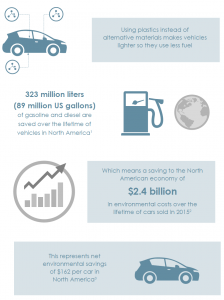The results of a new study are disrupting “conventional wisdom” about the sustainability of plastics. The study, conducted by Trucost, found that the environmental costs of using plastics in packaging and consumer goods is nearly four times less than they would be if plastics were replaced with alternative materials. While the environmental costs to produce the alternative materials may be lower, a more comprehensive outlook reveals that the total environmental costs are greater due to the much larger quantities of material needed to fulfill the same purpose as plastics. In other words, significantly less plastic is needed to do the same job as alternative materials, thereby decreasing the total environmental cost.
 The study also found that, in addition to lowering environmental costs, plastics can enable significant environmental benefits during use. For example, plastics can make cars more fuel efficient, and plastic packaging can play a large role in minimizing food waste.
The study also found that, in addition to lowering environmental costs, plastics can enable significant environmental benefits during use. For example, plastics can make cars more fuel efficient, and plastic packaging can play a large role in minimizing food waste.
In addition to enumerating plastics’ environmental benefits, the study provided recommendations to help companies that make and use plastics minimize their environmental footprint.
The good news is the industry is already working on many of these recommendations – and we’re making progress.
One recommendation is to increase the amount of plastic recovered and recycled. Plastic recycling has grown significantly over the past decade: the volume of plastic bottles recycled has grown every year since 1990, topping 3 billion pounds in 2014. The amount of other rigid plastics recycled has quadrupled since just 2007. And the recycling rate for plastic film – including plastic bags and product wraps – has increased by 79% since 2005. As consumer access to curbside and other recycling programs increases, we expect to see these numbers continue to grow.
Another recommendation is to invest and implement efficient packaging technologies. Over the years plastic packaging has become increasingly lightweight without compromising the product it protects. Think of super light, flexible pouches, often used for soups, nuts, dried fruit and tuna. Fit-for-purpose plastic packaging allows us to ship more product with less package, which helps lower energy use and greenhouse gas emissions throughout the supply chain.
Trucost also recommends recovering plastics before they reach our oceans, which could cut environmental costs by more than $2.1 billion. Plastics makers have publicly committed to work to combat marine litter, and have launched more than 260 projects to help prevent plastics from entering our waterways. The projects include strengthening waste management systems and practices, increasing access to recycling, and advancing energy recovery technologies that convert non-recycled plastics into resources such as fuels or feedstock to generate new plastics.
Finally, the study suggests that the industry take the lead in driving improvements in the environmental performance of the plastic supply chain. The use of natural gas emits less greenhouse gases than some alternative energy sources. Plastic makers already use natural gas sourced liquids as our primary feedstock, resulting in fewer emissions, and we are gaining efficiencies through improved distribution. The recommendation to increase the use of renewable energy will be a tougher lift in current conditions, but this industry does not shy away from a challenge.
It’s an exciting time for plastics and for sustainability. Economic growth in emerging economies is creating opportunities for more people to access health and hygiene products, good nutrition and things that help us get more out of life. Plastics make it easier to produce and transport these items with a smaller environmental footprint. And, at the end of their useful life, more and more of these items can be recycled into new products or recovered for energy.
This new report sheds light not only on the many benefits of the plastics we use every day, but on opportunities to make smarter choices about how we produce, use and reuse plastics in ways that will benefit people and the planet.





